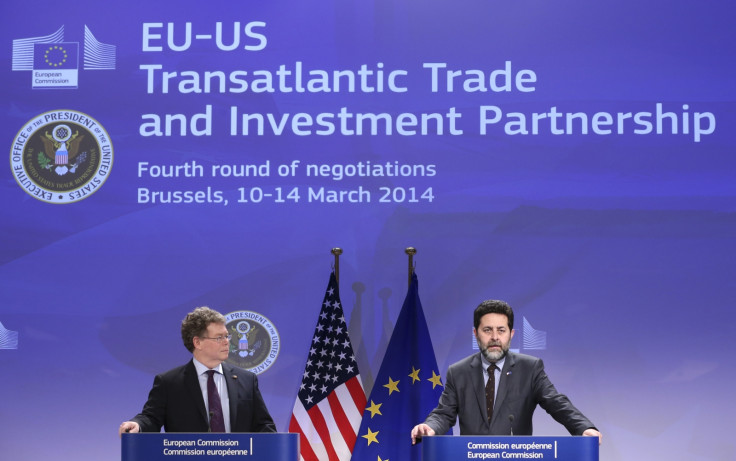TTIP: Government Will Not Exclude NHS From Free Trade Agreement

The UK government has no plans to exclude the NHS, or any other public service, from the free trade agreement which is being negotiated between the EU and US.
Speaking to journalists today, Trade Minister Lord Livingston said the Transatlantic Trade and Investment Partnership (TTIP) would not have any impact on the NHS and, therefore, the UK negotiation team will not be pushing for its exclusion.
"The idea that this will lead to privatisation of the NHS is not true," Livingston said, adding that individual procurement groups will make decisions over whether to use US healthcare providers and that should TTIP come into effect, "the NHS will still look like it does today".
The statement serves to clarify the government's stance and comes despite pressure from trade unions and NGOs to veto the inclusion of public services in TTIP.
Livingston said that each European government has been working closely with negotiators, ensuring that their views had been represented at the table, but there has been no request to exclude any area of the UK's economy.
Opponents of the agreement have claimed that a controversial investor-state dispute settlement (ISDS) clause will allow third-party companies to sue the UK government, should local health regulations impede on their profits.
Livingston said that ISDS has been "misrepresented and misunderstood". The UK is currently signed up to more than 90 ISDS clauses across all the free trade agreements it has agreed in the past, with an aggregated running time of 2,000 years. The UK has lost no cases pertaining to ISDS, Livingston said.
"This ISDS clause will be even tighter. We will make it more transparent, a new and improved ISDS that will be even tighter," he said.
Campaigners have also claimed with TTIP, the privatisation of the NHS which has happened to date will be impossible to reverse in the future. Responding to this claim, the minister said that TTIP would have "no further impact" on existing third party contracts.
TTIP discussions have been criticised for lacking transparency, with the EU Trade Commissioner Karel De Gucht last week adding his name to a motion calling for the original TTIP mandate to be declassified.
Livingston dismissed this move as "unnecessary", since the document had already been leaked online. He also rejected calls to declassify further TTIP documents, saying that it would weaken the EU's negotiating position.
"There have been press briefings, Q&As, consultations, roadshows. In many ways, this is the most open thing the EU has done. There's been a huge amount of discussion," he said, in response to questions over the perceived lack of transparency.
A series of leaked documents have only served to sharpen critics' knives, with some claiming that they prove that negotiators are looking to reduce standards, with particular reference to food. However, Livingston said that the documents are "a long way from being complete" and that they are mostly consultation papers.
The government claims TTIP could add £10bn to the UK economy each year, with consumers seeing savings due to the removal of import tariffs on popular US goods, including jeans (12%) and cars (10%). Less red tape will help UK businesses export to the US, with excluded products such as British lamb and venison, being permitted entry to the US market.
The minister was keen to talk up the benefits of the treaty, saying that it would stand to benefit companies based outside of London more than those in the capital.
The government projects that the South East's exports to the US will rise to £3.7bn, the North West to £2.6bn and the East to £1.5bn.
He said that small businesses, who are not able to produce multiple product lines to meet varying standards in the EU and US, would benefit from regulatory standardisation.
"The biggest benefits will come for consumers and small businesses," Livingston said, adding that he anticipated lower prices and more product choice for UK consumers.
When negotiations began in 2013, parties on both sides had hoped for a conclusion by the end of 2014. Livingston said that it is now hoped for a resolution in 2015, after which the individual national parliaments of the EU will vote on the agreed text. If successful, it will pass to the ratification stage.
A survey, conducted by YouGov on behalf of 38 Degrees and released last week, found that 39% of British people think that TTIP "would be bad for the UK", with just 13% saying it would have a positive effect.
When asked specifically about the NHS, 24% said their trust in the government to shield the NHS from privatisation has fallen over the course of a year, with just 4% saying it has risen.
© Copyright IBTimes 2025. All rights reserved.






















